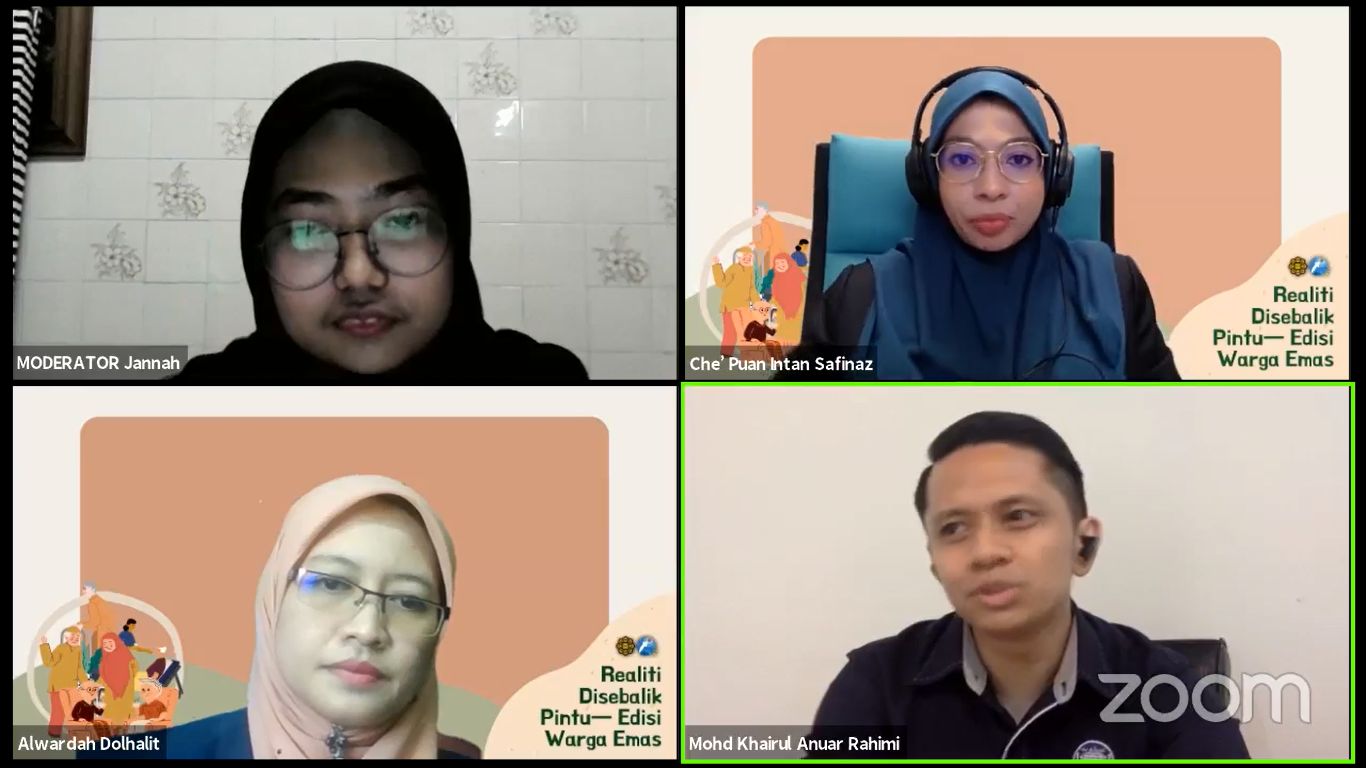By Rafiqi Yusoff
GOMBAK, 10 November 2021: As Malaysia moves towards an ageing country by the year 2030, many Malaysians are still unaware of the real issues related to the elderly community particularly during the COVID-19 pandemic.
Although the Elderly Care Centres have been established for ages, the societal stigma still exists in Malaysian society in which many still lack knowledge on its actual functions for the elderly community, a topic that a talk on the topic aimed to shed light on.
The speakers, Dr. Mohd Khairul Anuar Rahimi, a Gerontology Counsellor and Senior Lecturer in Universiti Sains Islam Malaysia, Madam Alwardah Dolhalit, a Senior Teacher of Gerontology and Geriatrics, and Che Puan Intan Shafinaz, the Director of Laman Khaira Elderly Care Centre shared their views during a talk titled œReality Behind The Closed Door- Elderly Edition.
According to Dr. Khairul, an ageing country is categorised into three groups based on the criteria set by the United Nations (UN):
i. Ageing Society: when the population aged 65 and overreached 7% of the total population.
ii. Aged Society: when the population aged 65 and overreached 14% of the total population.
iii. Super-aged Society: when the population aged 65 and overreached 20% of the total population
Dr. Khairul stated that gerontology is the scientific study of old age, the process of ageing, and the particular problems of older people. And it is essential as a future preparation for every layer of the community to help the elderly achieve successful ageing and have a contented life when they get older.
œThe elderly can be categorised as a group with special needs. Hence, it is significant for us now to focus on public health, social, behavioural, and biological concerns related to the needs of older adults, Dr. Khairul added.
However, he remarked that the studies from other fields such as sociology, anthropology, psychology, and public health are crucial for advancing ageing research and community in contributing to the betterment of policies in work and retirement and access to long-term health care.
In terms of education, Madam Alwardah shared that there are only three schools that offer Gerontology as a subject to students at the school level in Malaysia.
œThe syllabus of the subject covers theoretical learning and practical training whereby students are exposed to the basic knowledge of ageing such as the emotional and psychological changes among the elderly and they were also prepped with fundamental practical knowledge, Madam Alwardah said.
She also shared that having the subject of Gerontology and Geriatrics introduced at school level, it could be a massive opportunity in filling the empty spots for the workforce in geriatrics and gerontology.
Alwardah further elaborated that the subjects mentioned help students to be enlightened to the elderly communitys issues during their youth that could break down the negative stigma towards ageing.
Moreover, Madam Intan Shafinaz shared that the negative stigmas of the children sending their parents to the Elderly Care Centre as a deviant act of abandoning their parents, are no longer valid due to several reasons.
Among the reasons she mentioned are due to the lack of proper knowledge in handling the elderly, especially those with decreased physical and mental ability who require extra care and attention.
Parents could benefit from nursing care to improve their socialisation and adapt to a new and healthy routine conducted by the caregivers.
œSending parents to nursing care is equivalent to parents who send their child to daycare. It is not an act of abandonment or neglect. Instead, it is an act of love and care in ensuring the well-being and safety of older people, Madam Intan Shafinaz said to debunk the stereotypes.
Organised by the Secretariat of Sociology and Anthropology (SOCASA) IIUM, the talk was aimed to enlighten the society on the reality of elderly care during the COVID-19 pandemic and to advocate awareness about the importance of elderly care.
This webinar, attended by Gerontology students from SMK Seksyen 24(2) and IIUM students, was held live via Zoom Meeting on Saturday (30 October).
The recording of the webinar can be viewed on the Facebook page of SOCASA IIUM.***
